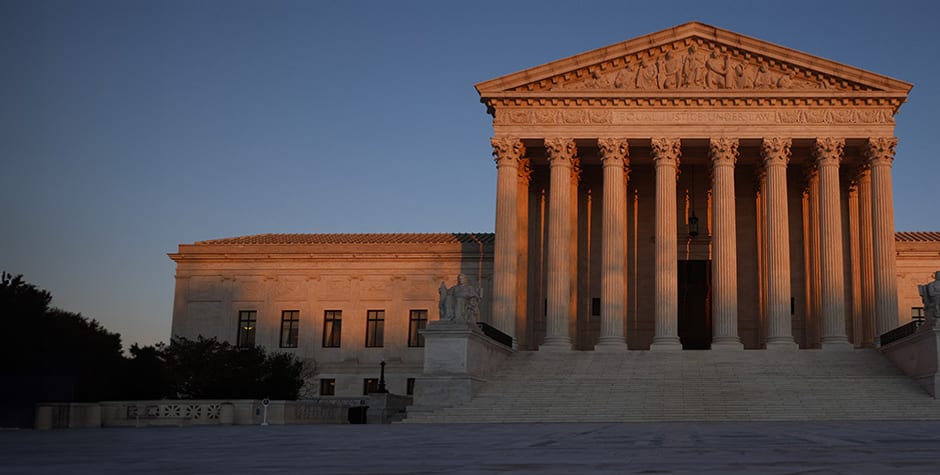ACLJ Files Brief Calling on Supreme Court To Stop Forcing Jewish Professors To Be Represented by Antisemitic Union
Listen tothis article
The ACLJ is proud to have fought many legal battles for Jewish Americans and for Israel – from the recent lawsuit we won on behalf of a teacher fired from an American university for her Jewish identity to the recent appearances we have made to the United Nations defending Israel’s right to exist. We have now filed a major amicus brief at the United States Supreme Court, urging the Court to protect the First Amendment rights of Jewish professors who refuse to be represented by antisemitic unions.
We just filed an amicus brief in Goldstein v. Professional Staff Congress/CUNY (PSC). This case presents a critical opportunity to defend academic freedom and protect the fundamental right to free speech on our college campuses. It is about resisting a culture of intimidation and coercion that seeks to silence dissenting voices and restrict religious and ideological diversity within higher education.
A number of Jewish professors at City University of New York (CUNY) voiced concerns about the growing political bias within the Professional Staff Congress (PSC) union, which is supposed to represent faculty and staff members. The union began acting contrary to their interests in a variety of ways, taking an increasingly partisan stance on social and political matters. The union’s leadership, which claims to advocate for all its members, instead created an environment that punishes those who do not align with its ideological agenda. Most strikingly, the union adopted a resolution supporting the antisemitic BDS (Boycott, Divestment, and Sanctions) movement. As a result of PSC’s resolution and subsequent conduct, Jewish professors have been ostracized on campus based on their identities, religious beliefs, and support for Israel.
These professors wanted to boycott the union and were unwilling to allow the union to speak for them. But New York law forbids professors from dissociating themselves from PSC. They are compelled to continue to accept PSC as their exclusive agent and spokesman, regardless of how strongly they disagree with their union’s conduct or how counter to their fundamental identity the speech of the union may be. The court system has so far agreed, concluding that no First Amendment rights were violated here. These professors have sought the Supreme Court’s review in this case, urging the Court to protect their rights.
Our amicus brief urges the Supreme Court to take up the case. At stake are the government employees’ rights that are protected by the First Amendment, as the employees are forced to have another speak for them, even when that speech is contradictory to their conscience or, as here, their very identity.
The threats of compelled speech are always serious, but they are particularly dangerous and egregious when union members are compelled to have a representative who speaks counter to those members’ consciences. The anti-Israel speech in which the professors were compelled to participate here is a symptom of a larger trend, whereby many large unions across the nation have issued statements that attacked the State of Israel in the months following the brutal October 7 attack on Israel, including statements threatening basic Jewish identity.
Our brief urged the Supreme Court to take up the case and correct past precedent that upheld exclusive mandatory representation. We explained: “Unions function as political activity groups and de facto auxiliaries of a political party and should be treated as such. No one should be forced to participate in such public advocacy against their will.”
The First Amendment guarantees every citizen – including public employees – the right to speak freely and associate with others without fear of reprisal or coercion. Yet, the PSC is able to mandate that these Jewish professors let PSC speak for them, and it leaves them without recourse when it does so in contravention of their conscience.
The implications of Goldstein v. PSC extend far beyond one professor’s individual rights. Unions like the PSC often claim to defend the interests of their members, yet their actions sometimes reveal a disturbing willingness to stifle internal dissent and push a singular agenda. This is not just a betrayal of their members – it’s an assault on the fundamental principles of free speech and association that form the bedrock of our democracy. For this reason, Goldstein v. PSC is a crucial battle in the larger fight to preserve the rights of individuals to speak freely, to hold differing opinions, and to seek fair treatment in the workplace.
The ACLJ has a long history of defending free speech and religious liberty in the public sphere. Our legal team is actively involved in cases across the nation where these rights are under threat. Whether it’s in the workplace, on college campuses, or in the public square, we are dedicated to ensuring that every individual’s voice can be heard and that no one is discriminated against for expressing their beliefs. Together, we can make a difference and ensure that our schools and workplaces remain environments where freedom and truth are valued and protected.
